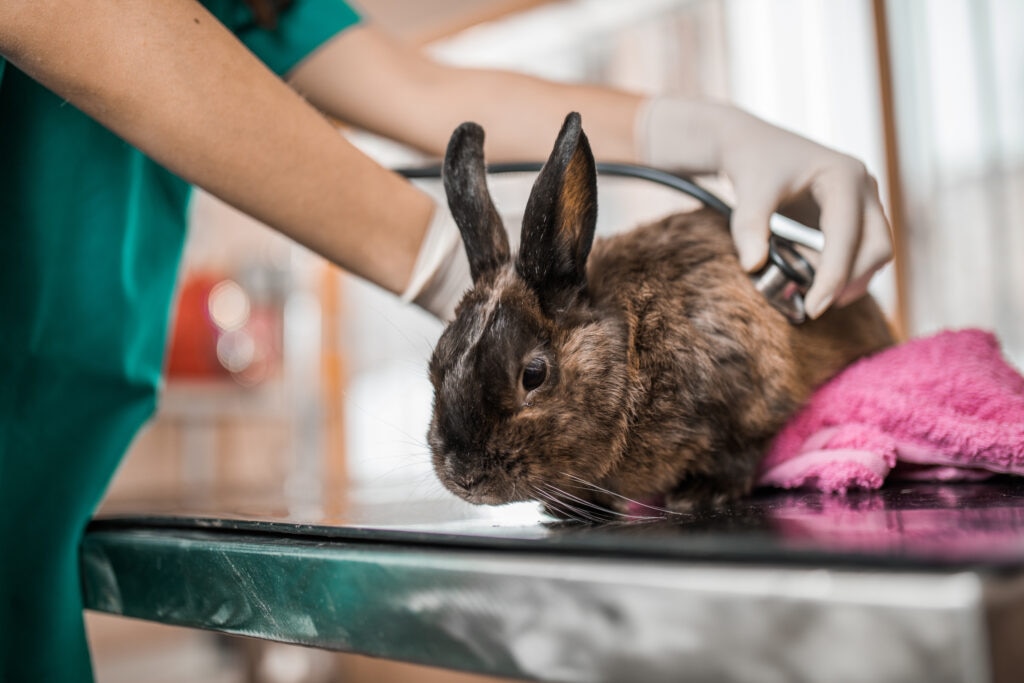What Is E. Cuniculi in Rabbits? What Are the Symptoms?

Photo by skynesher/E+
Encephalitozoon cuniculi, or E. cuniculi for short, is a tiny parasite that most often affects rabbits. Many bunnies carry it without ever showing signs, but some can develop brain, kidney, or eye problems.
Because the parasite can hide in a rabbit’s body, it’s important to know what signs to look for and how to respond. If your rabbit suddenly shows severe head tilt, seizures, or struggles to move, get in touch with your vet right away.
From recognizing the infection to supporting your pet through treatment, here’s what you need to know about E. cuniculi in rabbits.
Key Takeaways
- E. cuniculi is a common parasite in rabbits that usually targets the brain, kidneys, and eyes. Many rabbits carry it without ever getting sick, but it can cause serious problems in some cases.
- Signs of illness can be subtle at first, like changes in eating, grooming, or balance. More obvious signs include head tilt, seizures, or eye and kidney issues.
- If your rabbit does show signs of an infection, early veterinary care is important. While there’s no cure that completely removes the parasite, vets can manage the infection with medication and supportive care to keep your rabbit comfortable.
- You can help your rabbit at home by making their space safe and easy to navigate, assisting them with feeding and grooming if needed, and practicing good hygiene to reduce the risk of spreading the parasite.
What Is E. Cuniculi in Rabbits?
E. cuniculi is a microscopic parasite that mainly affects a rabbit’s kidneys, brain, and eyes. The parasite belongs to the microsporidian family, which is closely related to fungi.
While rabbits are most likely to develop illness from E. cuniculi, other animals—including mice, dogs, cats, guinea pigs, and even humans with severely weakened immune systems—can also carry it.
Studies suggest 50–70% of rabbits may test positive for E. cuniculi, though many never show symptoms, says Colleen Roman, DVM, RVT, exotic animal veterinarian and founder of AnimALL Mobile Veterinary Service in Atlanta, Georgia.
That’s because most healthy rabbits can keep the parasite in check—E. cuniculi only tends to cause problems when a rabbit’s immune system is weakened, such as during stress, illness, or in older rabbits, says Rae Porter-Blackwell, DVM, ABVP, a board-certified exotic companion mammal specialist at The Center for Bird and Exotic Animal Medicine in Bothell, Washington, and president-elect of the Association of Exotic Mammal Veterinarians (AEMV).
What Are the Signs of E. Cuniculi in Rabbits?
When symptoms do show up, they can vary. Some are subtle, like changes in bathroom habits, while others, like a head tilt, are more obvious.
Some of the most common signs, which can range from mild to severe, include:
- Head tilt or “wry neck”
- Loss of balance or coordination
- Seizures or tremors
- Eating less or showing less interest in favorite treats
- Changes in urination
- Changes in drinking habits
- Eye problems, like cataracts or lens issues
- Lethargy
- Difficulty grooming
Because early signs aren’t always obvious, it’s important to watch for small changes in behavior, especially if you have multiple rabbits or a new rescue.
Even minor shifts in eating, mobility, or grooming can be a sign that you should check in with your vet.
What Causes E. Cuniculi in Rabbits?
Rabbits can pick up E. cuniculi in a couple of different ways, usually through everyday interactions. Dr. Roman says the main ways E. cuniculi spreads are through:
- Horizontal transmission: Ingesting or breathing in spores shed in the urine of infected rabbits. This is the most common way pet rabbits become exposed.
- Vertical transmission: When a mom passes the parasite to her babies during pregnancy.
Once inside the rabbit’s body, the parasite can travel through the bloodstream to the brain, kidneys, and eyes.
How Do Veterinarians Treat E. Cuniculi in Rabbits?
There’s no cure that completely wipes out E. cuniculi, but veterinarians can help you and your rabbit manage it.
Dr. Roman says that treatment often includes:
- Anti-parasitic medicine, usually fenbendazole (often under the brand name Panacur), given by mouth for several weeks.
- Supportive care, like fluids, special feeding, and helping rabbits eat if neurological symptoms make it difficult.
- Symptom management, including anti-inflammatory or other medications for head tilt, seizures, or loss of balance.
- Quality-of-life support, which can include physical therapy, laser therapy, or acupuncture for mobility issues.
Dr. Porter-Blackwell says that early detection improves the chances of a good outcome—how well a rabbit responds to treatment often depends on how serious their symptoms are.
Bunnies with mild signs usually bounce back well, but those with serious nerve or kidney problems might have ongoing health issues.
That’s why it’s important to contact your vet as soon as you notice anything unusual.
How Can I Help My Rabbit Feel More Comfortable?
Recovery from E. cuniculi can take weeks to months, and in some cases, clinical signs may never completely go away, says Dr. Roman.
At home, you can make life easier for a rabbit recovering from E. cuniculi by:
- Providing a safe, padded space to prevent injuries, especially for rabbits with head tilt or balance issues. Soft fleece pads, like the Paw Inspired Cage Liner, or small animal playpens with cushioned floors work well.
Recommended Product
- Keeping food, water, and litter boxes easy to reach. Low-entry litter boxes, like the Oxbow Small Litter Pan, and shallow dishes make it easier for rabbits with mobility issues to eat and go to the bathroom. Dr. Roman says you should never leave a rabbit with neurological signs or mobility concerns alone with large water bowls, though, as they have an increased risk of drowning.
Recommended Product
- Helping with grooming and cleaning, since rabbits with mobility problems may not be able to keep themselves clean.
- Reducing stress with a calm, quiet environment. You might have the urge to separate an infected rabbit from a bonded pair, but Dr. Roman says this can be unnecessarily stressful. Plus, it’s likely the other rabbit is already infected but asymptomatic.
- Providing soft bedding or heated pads for comfort, particularly if your rabbit has difficulty moving or staying warm. The Ware Small Animal Sleeper Bed is a good option.
Recommended Product
These changes can make your rabbit more comfortable and prevent new issues from popping up while they heal.
How Do I Prevent E. Cuniculi in My Rabbit?
Prevention can be tricky, since many rabbits carry the parasite without ever showing symptoms. However, you can reduce the risk by:
- Checking breeding conditions: If buying a rabbit, ask the breeder about E. cuniculi testing and living conditions.
- Testing new rabbits: Before introducing a new rabbit to your home, find out its E. cuniculi status. Dr. Porter-Blackwell says a positive test shouldn’t stop you from adopting, though. She has healthy, E. cuniculi-positive rabbits that live perfectly normal lives. You may just want to separate positive and negative rabbits.
- Practicing good hygiene: Wash your hands after handling rabbits and clean cages with effective disinfectants, like 0.1% bleach for 10 minutes, 70% ethanol for 30 seconds, or peroxide for 30 minutes if you have had a recent positive rabbit, says Dr. Roman. Make sure to rinse thoroughly and dry after recommended contact time.
- Limiting exposure: Avoid contact with unknown rabbits or potentially infected animals. If you do encounter other animals, wash your hands well before handling your rabbits.
FAQs About E. Cuniculi in Rabbits
What are the symptoms of E. cuniculi in rabbits?
A: Symptoms vary but can include head tilt, loss of balance, seizures, kidney problems, and eye issues. Some rabbits carry the parasite without ever showing signs.
Can a rabbit survive E. cuniculi?
Yes! In fact, many rabbits never get sick. Symptomatic rabbits can improve with early treatment and supportive care, though severe neurological or kidney problems are harder to treat.
What cleaner kills E. cuniculi?
Disinfectants like bleach or peroxide can kill E. cuniculi spores. Regular cage cleaning also helps reduce risk.
How do you treat E. cuniculi infection?
There’s no treatment that eliminates E. cuniculi, but veterinarians can help manage it with anti-parasitic medication like fenbendazole, supportive care, and symptom-specific treatments for issues like head tilt or seizures.
Some rabbits also benefit from physical therapy, laser therapy, or acupuncture.






